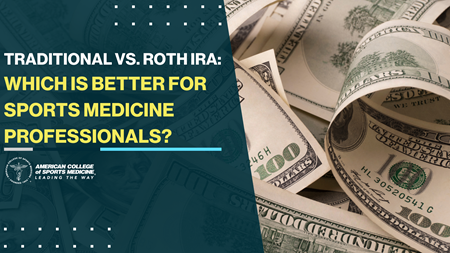Jason Korzan |
Sept.
22, 2023

Ever found yourself painfully stuck between two choices? Having an internal debate, weighing each option over and over? You think, “It’s only been a few minutes, right?” And then you look at your phone. It’s 3 a.m. Great.
I’ve been there. Many times.
If you’re a sports medicine pro, you’ve probably juggled countless decisions, from treatment plans to rehab routines. But here’s the real kicker: Choosing between a traditional IRA and a Roth IRA can be just as vital as any game-time decision.
But don’t worry. As a financial advisor in this industry, I know the financial ups and downs you face, and I’ve walked many clients through this exact same crossroads.
Both of these retirement savings vehicles have their merits and can play a significant role in helping to ensure your financial stability down the road. However, the choice between them isn’t always straightforward. After you’ve had a read through this article, you won’t just be wading in the dark when it comes to traditional and Roth IRAs. Nope — you’ll have a clear picture of how each one works and how it can play into your life. You’ll be more confident in making a choice that matches your goals and sets you on the right path.
Traditional IRA: Tax-Deferred Savings
Let’s start with the traditional IRA. This retirement savings option has been a go-to choice for many professionals over the years, and it offers several key advantages that may appeal to sports medicine professionals.
Tax Deductions Today, Taxes Tomorrow
One of the primary benefits of a traditional IRA is its immediate tax advantage. When you contribute to a traditional IRA, your contributions are typically tax deductible in the year you make them. This means you can reduce your taxable income, potentially lowering your tax bill for the year in which you contribute. For sports medicine professionals who have a higher income, this upfront tax deduction can be a significant perk.
Tax-Deferred Growth
Another advantage of a traditional IRA is that your investments within the account can grow tax deferred. This means you won’t pay taxes on any earnings or capital gains generated by your investments until you withdraw the money in retirement. This tax deferral can allow your investments to compound and grow more quickly over time, potentially resulting in a larger nest egg when you retire.
Consider for High Earners
If you earn a substantial income, a traditional IRA can be a valuable tool for reducing your current tax liability. The ability to deduct your contributions can result in a lower tax bill, freeing up more money to invest or spend as you see fit. Plus, since there are no income limits for contributing to a traditional IRA, high-earning professionals can take full advantage of this tax benefit.
Now, let’s talk about a Roth IRA.
Roth IRA: Tax-Free Distributions
The standout feature of a Roth IRA is that qualified withdrawals in retirement aren’t taxed as income. This means that when you retire and start tapping into your Roth IRA, you won’t owe income taxes on the money you withdraw, including any investment gains. This can be a significant perk.
No Required Minimum Distributions (RMDs)
Another noteworthy benefit of the Roth IRA is that it’s not subject to required minimum distributions (RMDs) during your lifetime. With a traditional IRA, the IRS mandates that you start taking withdrawals once you reach a certain age (currently 72), whether you need the money or not. This can be a drawback for those who would prefer to leave their retirement savings untouched for as long as possible. With a Roth IRA, you have the flexibility to let your investments continue growing income tax free without being forced to take distributions.
Flexible Contributions
Roth IRAs also offer flexibility when it comes to contributions. While there are income limits that determine how much you can contribute to a Roth IRA each year, these limits are higher than many people realize. Sports medicine professionals with varying income levels can often find a way to contribute to a Roth IRA, either directly or through a backdoor Roth strategy. This flexibility can be a valuable asset in your retirement planning tool kit.
Which Option Is Better for Sports Medicine Professionals?
Now that we’ve examined the key features of both traditional and Roth IRAs, you might be wondering which is the better choice for sports medicine professionals. The truth is, there’s no one-size-fits-all answer. The decision between a traditional and Roth IRA depends on your individual financial situation, goals and tax considerations. Let’s break it down further:
Traditional IRA for Sports Medicine Professionals:
- Tax Deductions. If you’re looking to lower your current tax bill, a traditional IRA’s immediate tax deduction can be a powerful tool, especially if you’re in a high income bracket.
- Tax-Deferred Growth. The ability to grow your investments tax deferred can lead to more significant growth over time, potentially resulting in a larger retirement nest egg.
- Consider for High Earners. Sports medicine professionals with higher incomes can fully leverage the tax benefits of a traditional IRA, as there are no income limits for contributions.
Roth IRA for Sports Medicine Professionals:
- Income Tax-Free Distributions: If you anticipate needing tax-free income in retirement, a Roth IRA offers this benefit, which can be particularly appealing if you’re concerned about future tax rates.
- No RMDs: The absence of required minimum distributions allows your investments to continue growing income tax-free for as long as you like, providing greater flexibility in retirement planning.
- Flexible Contributions: Roth IRAs offer options for contributions that can accommodate a range of income levels, making them accessible to many sports medicine professionals.
Next Steps
- Current Tax Bracket: Assess your current tax bracket. If you’re in a higher tax bracket now and anticipate being in a lower one during retirement, a traditional IRA’s upfront tax deduction may make sense.
- Anticipated Retirement Tax Bracket: On the other hand, if you expect to be in a higher tax bracket in retirement or are concerned about future tax rates, a Roth IRA’s income tax-free withdrawals can be advantageous.
- Long-term Goals: Consider your long-term financial goals. If you want to leave a tax-efficient inheritance for your heirs or maximize your wealth transfer, a Roth IRA’s absence of RMDs might be a key factor.
- Diversification: Many sports medicine professionals choose to hedge their bets by contributing to both a traditional and a Roth IRA, allowing for a mix of taxable and tax-free income in retirement.
- Seek Professional Guidance: Finally, it’s essential to consult with a tax professional and a financial advisor who specializes in serving sports medicine professionals. They can help you navigate the complexities of tax planning, retirement savings and investment strategies tailored to your unique needs and goals.
The choice between a traditional and Roth IRA isn’t a one-size-fits-all decision. Both options offer distinct advantages, and the best choice for you depends on your specific financial situation and long-term goals. To make an informed decision, consider your current and anticipated tax brackets, your retirement goals, and the benefits each type of IRA offers. A financial advisor with experience in serving sports medicine professionals can provide invaluable guidance in aligning your retirement savings strategy with your career and lifestyle. Ultimately, the path you choose will play a crucial role in shaping your financial future, so take the time to make an informed choice that best suits your needs.
Related content:
Blog | The Pros and Cons of Hiring a Financial Advisor for Sports Medicine Professionals

Jason Korzan is based in Atlanta, GA and runs a financial advisory practice associated with Consolidated Planning. Having dedicated a significant portion of his professional life to assisting multimillion dollar manufacturing companies in financial management, he decided to turn his attention to his genuine passion: helping families organize, protect, and focus their financial resources. As a former collegiate baseball player, coach, and lifelong athlete, Jason focuses his practice on delivering tailored financial solutions to sports medicine professionals, helping them achieve financial fitness alongside their physical endeavors.
Registered Representative and Financial Advisor of Park Avenue Securities LLC (PAS). OSJ: 6115 PARK SOUTH DRIVE, SUITE 200, CHARLOTTE NC, 28210, 704-5528507. Securities products and advisory services offered through PAS, member FINRA, SIPC. Financial Representative of The Guardian Life Insurance Company of America® (Guardian), New York, NY. PAS is a wholly owned subsidiary of Guardian. Consolidated Planning, Inc. is not an affiliate or subsidiary of PAS or Guardian. CA Insurance License Number - 4318264.
Guardian, its subsidiaries, agents and employees do not provide tax, legal, or accounting advice. Consult your tax, legal, or accounting professional regarding your individual situation. The information provided is based on our general understanding of the subject matter discussed and is for informational purposes only. This material is intended for general use. By providing this content Park Avenue Securities LLC and your financial representative are not undertaking to provide investment advice or make a recommendation for a specific individual or situation, or to otherwise act in a fiduciary capacity. 2023-160458 Exp. 8/25